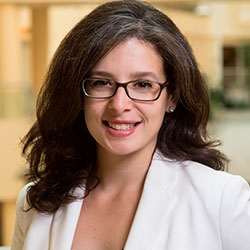2020-2021: Rachel DiBella

Rachel DiBella
2020-2021: Underserved Scholarship Awardee
Leadership Psychology PsyD
Favorite Quote
“Don’t ask what the world needs. Ask what makes you come alive, and go do it. Because what the world needs is people who have come alive.” — Howard Thurman
Rachel DiBella is a licensed psychotherapist, gender equity researcher, and national speaker. She currently serves as Assistant Director of the Title IX and gender equity education program at Harvard University. She regularly provides social justice consulting, counseling, and coaching to professional organizations through her private practice, WakingMinds.org. Rachel’s clinical practice has focused on trauma recovery, violence prevention and LGBTQ+ populations, and cultivating antioppression principles in the organizational context. Rachel is also on the faculty, part-time, at Boston College School of Social Work.
When asked about the importance of receiving a Serving the Underserved Scholarship, Rachel reflected,
“I am humbled and grateful to have been awarded the Scholarship. Although I have been trained as a clinician, I am also aware of the systems that reproduce the vulnerabilities often treated in the ‘mental health’ context. Throughout my career, I have been eager to accompany organizations, systems and their leaders toward a new understanding of how power often works to reinforce inequity, and how we can make long-lasting systemic change.”
Rachel aims to synthesize her interests in group dynamics, the study of power, and antioppression principles with her roles in leading programs and organizations. In particular, she is interested in consulting to provide social justice development to organizations in and around the Greater Boston area.
She wrote:
“Although my research and practice have been primarily dedicated to gender diversity, equity and inclusion issues, I know that it is essential for me to understand and acknowledge how my whiteness has affected the organizations and systems in which I participate. Thus, I am committing to self-work, and practices that unrelentingly unveil intersectionality in social justice-related issues, and bringing these practices into the organizations for which I volunteer and work.”
During her time at William James College, Rachel hopes to learn from her fellow students and find a sense of connection, in a community where we are all supported and challenged to give to and receive from one another. Rachel’s long-term goal, and dream, is to run a practice and retreat center that services organizations newly committed to liberatory forms of leadership. Although she currently teaches these concepts in the classroom, she is eager to bring theory to practice and shed light on pathways for individuals to reduce institutional harm, and positively influence the industries to which they are connected.
